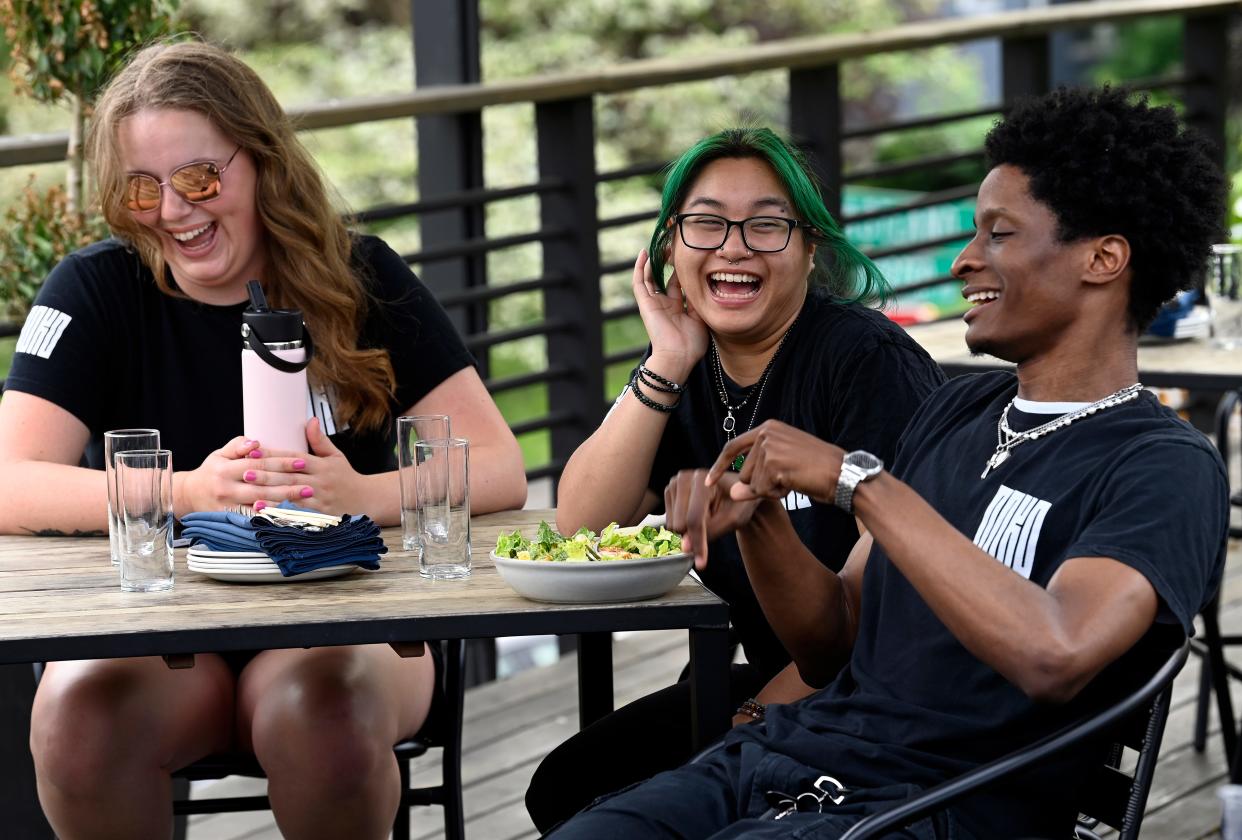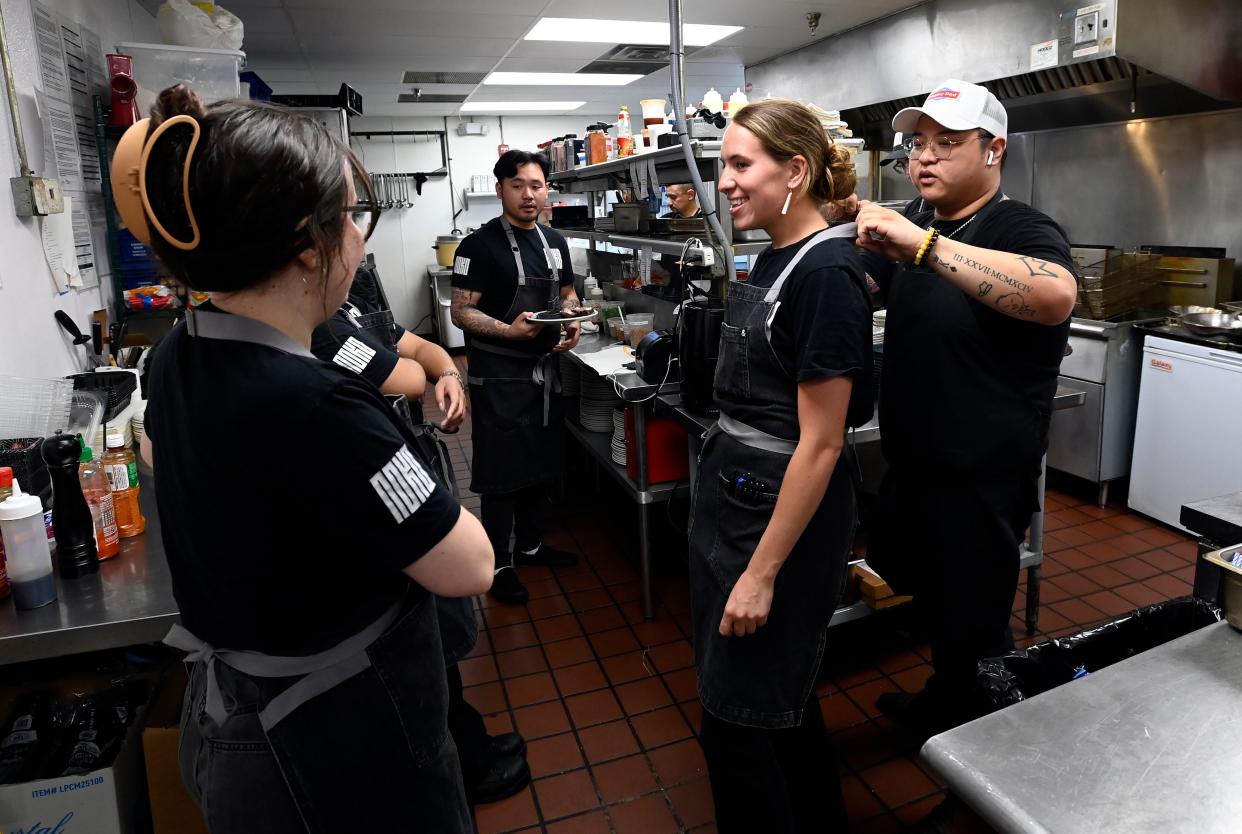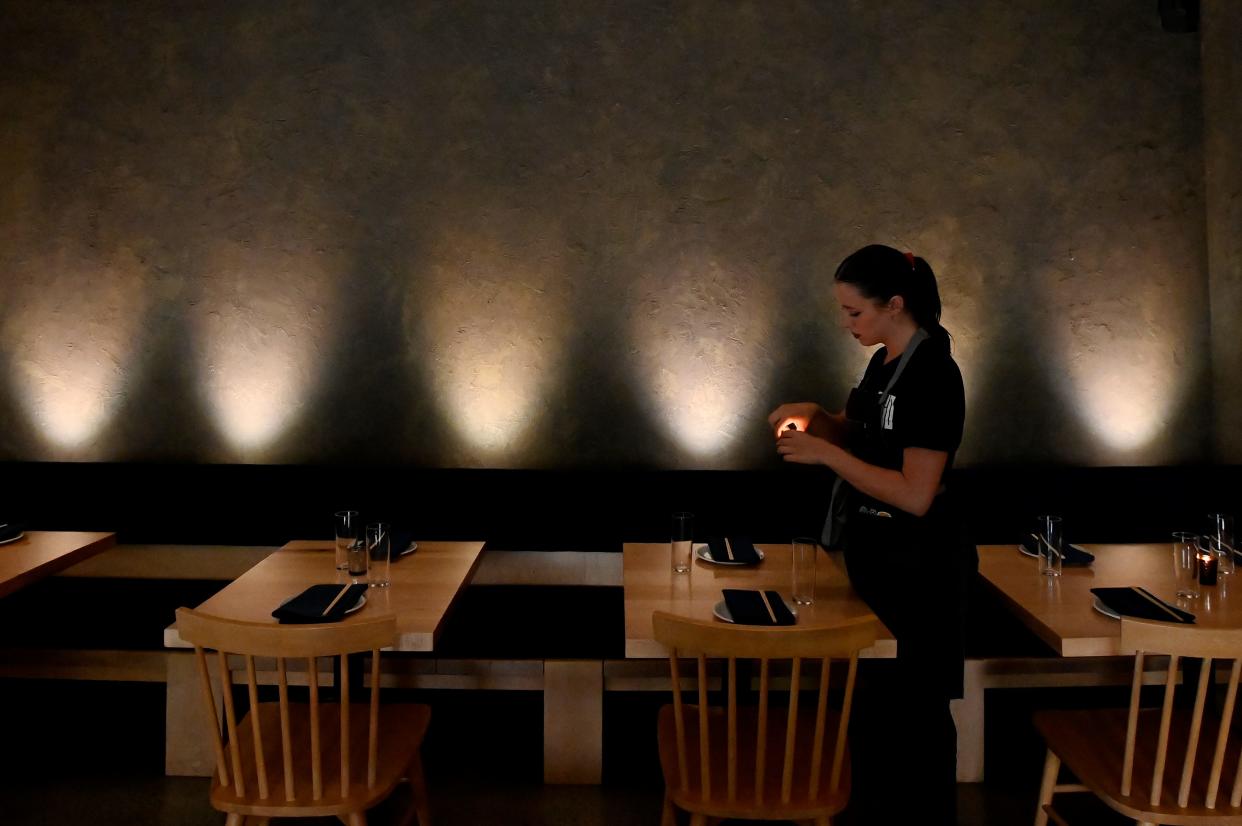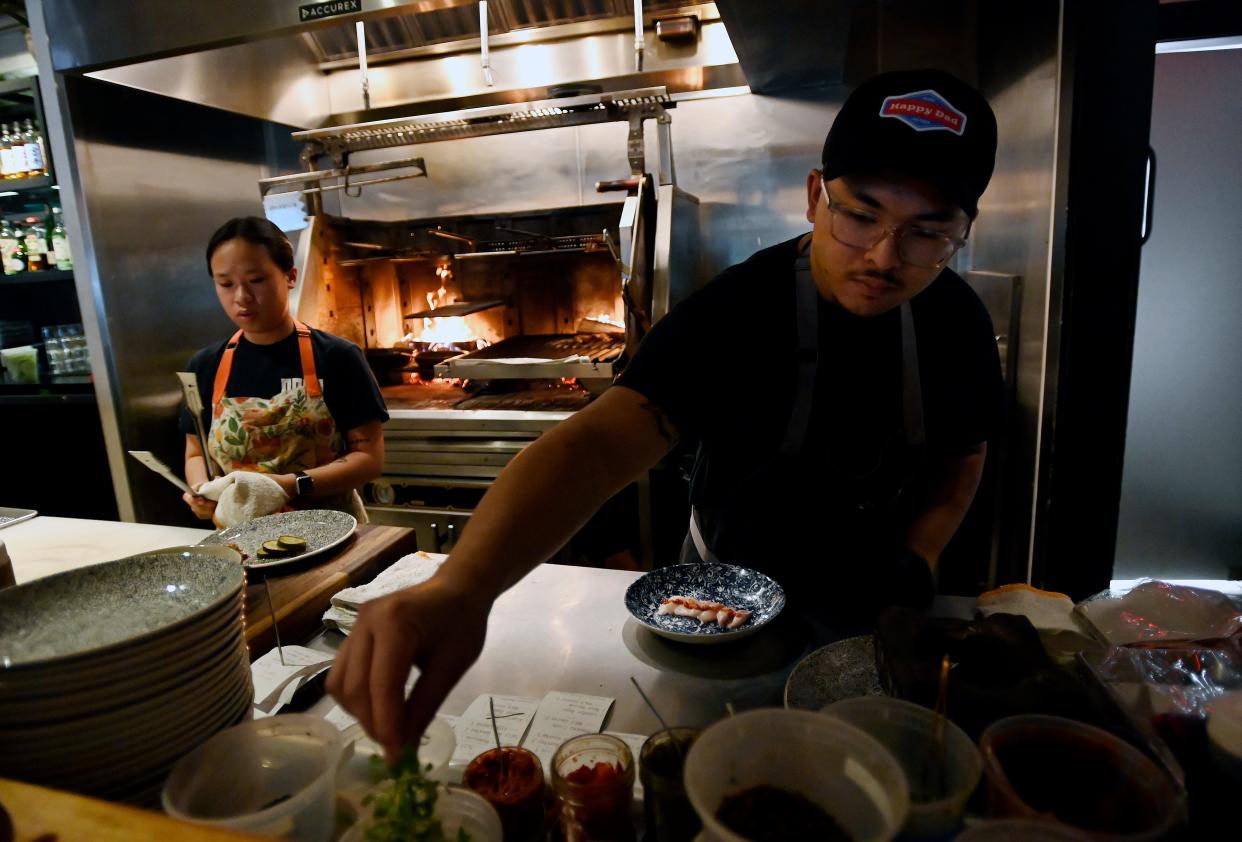A tall order: Managing mental health in Nashville's restaurant industry
It smells of smoke in the dining room of Noko in East Nashville.
A wood fire burns behind the chef’s counter, ready to sear the Asian-inspired modern restaurant's Tomahawk ribeye. Waiters, bartenders and cooks trickle in for the dinner shift. Sunlight streams in from the windows and pools on the floor. It’s peaceful. The calm before the storm.
At 4:30 p.m., everyone gathers for the pre-shift meeting. A familiar ritual.
They share what they are most grateful for. For Noko founder Jon Murray, it's a few extra hours of sleep — a scarce resource in this industry. Server Keith Josiah is grateful for an upcoming lunch with his niece.
Murray and his co-founder Wilson Brannock prioritize regular conversations with the staff about their challenges and successes to offset the demands of caring for so many diners. It's a necessary perk in an industry beset by a tight labor market and notoriously stressful working environments.
“We’re in the business of taking care of people," Murray said. "Why aren’t we taking care of ourselves?”
The heart-to-heart conversations at staff meetings are one facet of new benefits increasingly offered to Nashville restaurant workers.
Noko now offers comprehensive benefits rarely seen in restaurant work: Full-time employees have one week of paid time off every six months. Employees are also eligible for health, vision and dental insurance, a free gym membership and free telehealth therapy.
Staying focused on the positive aspects of life helps the team manage the swirling stress and dread that too often comes along with working in the hospitality industry.
The conversation during pre-shift is short, but it lightens the mood. There’s a busy shift ahead at Noko.
Just before 5 p.m., when the restaurant opens its doors, Tupac Shakur’s “Keep Ya Head Up” plays over the speakers.
A reminder.
The widespread problem of mental health in the restaurant business
A similar scene plays out every night in restaurants across Nashville, a city with one of the fastest growing hospitality industries in the country. The growth of the restaurant industry has coincided with unprecedented growth in the Middle Tennessee region and increased tourism in the city over the past few decades.

But while demand for restaurant and hospitality services has grown over the past several years, high food costs, inflation and skyrocketing commercial rent have battered an industry already weary from pandemic-related shutdowns.
It's an industry that requires long hours and very little time off. It's not uncommon for employees to work 10-hour shifts or longer. Decompressing after stressful shifts poses a challenge, too, and many turn to alcohol or illicit drugs to cope. When employees suffer from severe anxiety and depression, turnover is high, causing a vicious cycle of stress and burnout. In turn, customer service and reviews plunge.
Workers are also beholden to the demands of customers, who aren't always easy to please.
For business owners in Nashville who want to maintain staff, employee wellness has become one of the top priorities.
But it’s more than that, business owners say. For Sarah Worley, owner of popular breakfast restaurant Biscuit Love, employee wellness is about taking care of the staff in a holistic way, while also creating a positive place to work. She and her husband, Karl, set out to do that from the beginning. Solutions have included hiring therapists, offering employee benefits and building an uplifting culture.
“We had worked in good workplaces and bad workplaces,” Worley said. “Quite frankly, we wanted to create a place where we wanted to come work every day.”
Building a plan for employee wellness
During dinner service at Noko, things go from calm to controlled chaos in moments.
Fifteen minutes after opening, there are already ten groups seated in the dining room, and the phone at the host stand rings almost nonstop. Conversation swells as servers greet the tables, fill water glasses and take drink orders.
Bar manager Angel Lyle feels the pressure first. She has four customers sitting at the bar, which means she needs to greet them while juggling drink orders coming in from the dining room.
She makes four cocktails at once. Smoke from the chef's counter fire combines with the sharp smell of tequila, bubbles from a bottle of champagne. But her demeanor remains calm, especially when addressing the guests seated at the bar who ask about the tuna crispy rice and request to turn up the air conditioning.
It also heats up in Noko's kitchen, where cooks prepare small plates, most of which are either smoked or touched by open flame. Head chef Dung "Junior" Vo tries to gently yet firmly push his kitchen staff to improve every day.
“I just want the staff to come in and know that this job can be okay," Vo said. "It doesn’t have to be bad. It doesn’t have to be chaotic or unhealthy.”

Noko founders Murray, Brannock and Vo are hands-on during dinner service. With decades of hospitality experience between them, the trio knows how stressful the job can be. In 2022, they convened in Nashville to start Noko.
Mental health and employee wellness were among the very first topics of discussion when planning the business. They wanted to build a healthy place to work from the beginning.
“The three of us sat down and asked: 'What needs to change in our industry?'” Murray said. "During COVID, there was a mass exodus of people from hospitality. I don’t think that was by coincidence. How do we get people to keep coming back and create a life in this business?"
One primary challenge, they agreed, was the inability to take time off to recharge away from work. It’s not common to have paid time off in the restaurant business, and taking time away is nearly impossible when a restaurant is short-staffed.
Burnout sets in without breaks, and workers struggle to manage their mental health. That's where Noko's paid time-off policy comes in.
Another widespread problem in the restaurant industry is alcohol and drug abuse. It can be common for staff to self-medicate with drugs and alcohol, especially in attempt to relax after a stressful shift.
According to a 2015 report by the Substance Abuse and Mental Health Services Administration, accommodations and food service employees had the highest rate of illicit drug use and the highest rates of substance use disorder.
Murray himself has been sober for five years. Noko has a zero-tolerance policy for drugs and alcohol use before or during work. The restaurant also doesn't allow employees to have a shift drink after work is over.
"It’s a high-stress environment," he said. "The restaurant fills up, it’s busy for four or five hours, the restaurant empties. You’re taking care of people, so it’s easy at the end of the night of high stress to say: 'Hey let’s go get some drinks.' Before you know it, it’s three or four in the morning. That’s why I don’t drink anymore. It becomes a vicious cycle if you let it."

Fostering mental health at Biscuit Love
It was six months into Biscuit Love's first brick and mortar location when Worley knew she needed help.
She had a high standard for the workplace culture she wanted to build, but she didn't know how to start. As she continued to hire staff, they arrived with negative experiences and traumas accrued from other workplaces. Her staff wasn't equipped with conflict resolution skills, and sometimes didn't know how to decompress in healthy ways outside of work.
She turned to her own mother, who is a licensed therapist.
Worley and her mom didn't know exactly how the therapist job at Biscuit Love would work at first. She envisioned 10 hours in the restaurant per week, answering questions and acting as a professional resource for staff who were curious about improving their own mental health.
"How do we create a gateway drug to therapy?" Worley asked herself. "Everyone thought it was insane."
But slowly, Worley noticed a healthier culture emerging.
“We started seeing, for example, when someone was struggling at home, maybe with a teenager, they had someone with lived experience and professional experience to coach them through it," she said "It gave them a place to get it out, and they started showing up better at work.”
Now the staff care team is managed by Rachel Smith, who joined the team full time in 2023 when Worley's mom retired. Smith speaks fluent Spanish, which allows her to communicate with Biscuit Love staff members whose first language is Spanish. She started working at Biscuit Love as a server while she was studying to become a therapist. Now, she's celebrating nine years with the company.
"The biggest takeaway is that I'm able to connect with people in a different way," Smith said. "I think that's a really sacred thing."
No band-aid solutions to 'change hospitality forever'
While tools like paid time off and therapy have improved the workplace culture and staff mental health at restaurants like Noko and Biscuit Love, there's no one-size-fits-all solution for the widespread issue.
Murray and Worley are the first to say: restaurants have to make money in order to take care of their employees.
"I have investors," Worley said. "They've come to me and asked, 'Why are we doing this?'"
While the "why" is obvious to Worley, it helps quell investor concerns that staff retention rates are close to 87%.
That translates to cost savings in hiring and training new employees. High turnover can cause high stress for the staff who do choose to stay.
"When you’re short-staffed, someone bears the burden," Murray agreed. "And you see that in overtime hours worked. And you can see it in guest reviews."

As Biscuit Love has grown, staff care has grown with it. Now, Worley and Smith are in the midst of hiring a second therapist who can help with the new Biscuit Love locations in Birmingham, Alabama and Cincinnati, Ohio.
Worley has had to invent new solutions alongside the team at Biscuit Love. Solutions that aren't being deployed widely in the restaurant industry. She plans to continue holding a higher standard for her business so that her employees feel taken care of, whether they work in Nashville, Franklin, Birmingham or Cincinnati.
When it comes to making a permanent change in the restaurant industry, there is a long way to go.
Noko has been received warmly by the Nashville community in the first year it's been open. Business has been good enough to sustain the employee benefits program. But the leadership team is committed to changing the culture even outside the doors of the small restaurant.
"We’re moving in the right direction, but we’re nowhere near where we need to be," Murray said. "Our intention with Noko is to change hospitality forever for the better. That's a bold statement. We’re not going to do that by ourselves. We want to help be a catalyst for change for the better."
Reach reporter Molly Davis at mdavis2@gannett.com.
This article originally appeared on Nashville Tennessean: Nashville restaurants work toward managing mental health in employees
